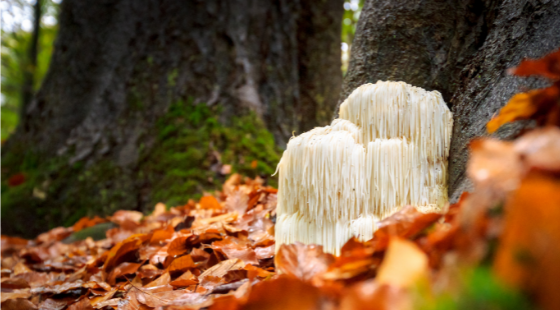
Lion’s Mane mushroom is known by many names, including the Latin Hericium Erinaceus, along with Bearded Hedgehog mushroom, and Monkey’s Head mushroom. Lion’s Mane mushroom has long been a staple for culinary and medical uses in Asian countries like China, India, Japan and Korea.
Human and animal studies alike have proven Lion’s Mane mushroom boasts countless medicinal and health promoting properties including anti-inflammatory, antioxidant and immune modulating components. Extracts from Lion’s Mane mushroom have been shown to have antibiotic, neuroprotective, glucose-lowering, and even anti-cancer effects.
Below, we review our Top 4 Health Benefits of Lion’s Mane Mushroom in more detail:
#1. Lions Mane Mushroom is Neuroprotective
Studies have shown that Lion’s Mane mushroom helps to combat Alzheimer’s disease, dementia and cognitive decline.
Two specific compounds have been identified in Lion’s Mane mushrooms that can stimulate the growth of brain cells these are hericenones and erinacines (1).
In fact, Lion’s Mane mushroom and its extracts have been found to reduce symptoms of memory loss in mice, as well as prevent neuronal damage caused by amyloid-beta plaques, which accumulate in the brain during Alzheimer’s disease (2,3,4). Additional animal studies have confirmed that Lion’s Mane mushroom may help protect against Alzheimer’s disease, a degenerative brain disease that causes progressive memory loss.
Older adults with mild cognitive impairment were studied and found that consuming 3 grams of powdered Lion’s Mane mushroom every day for four months improved their mental functioning significantly. It’s important to note that these benefits were transient, and disappeared when supplementation stopped (5).
#2 Lion’s Mane Mushroom May Help Prevent Cancer Growth
In 2012, a study evaluating the medicinal potential of 14 types of mushroom found that Lion’s Mane mushroom had the fourth highest antioxidant activity, which researchers described as “moderate to high.” (6) Antioxidant activity protects the body on a microscopic and cellular level from toxins, those we naturally produce during metabolism, and those we intake as a result of 21st century life.
Various studies have also shown Lion’s Mane mushroom’s ability to support various immune responses in the body. Specifically, it has been shown to increase levels of T cells (the part of our immune system that attacks foreign pathogens ) and macrophages (a type of white blood cell that destroys bacteria and other harmful organisms), and appeared to promote anti-tumor activity of the immune system in mice (16).
#3 Lion’s Mane Mushroom May Reduce Anxiety and Depression
There have been numerous studies showing that consuming Lion’s Mane mushroom can help with reducing symptoms of anxiety and depression. A daily dose of Lion’s Mane mushroom is a good way to help support the health and growth of nerves within the hippocampus, which is the part of our brain that controls emotions.
In a Japanese study, women with a variety of health complaints, including menopausal symptoms and poor sleep quality, ate cookies containing Lion’s Mane extract or placebo cookies for 4 weeks. The participants who ate the extract reported lower levels of irritation and anxiety than those in the placebo group (7).
#4 Lion’s Mane Mushroom Supports Nerve Health
Lion’s Mane mushroom has been shown to be of use in the regeneration of peripheral nerves (that is, those outside of the spinal cord), suggesting it could have a benefit to help the physical recovery of those who have experienced trauma. (11)
Research determined that Lion’s Mane mushrooms extracts may promote the growth of nerve cells and therefore, more rapid repair after injury. (9) One study found that rats with nerve damage receiving a daily extract of Lion’s Mane mushrooms had quicker nerve regeneration than control animals (10).
One of the complications of diabetes is nerve damage resulting from prolonged periods of high blood sugar. In a 2015 study on rats, in which they ingested Lion’s Mane mushroom extract for 6 weeks, showed positive results, including lower blood sugar levels, reduced feelings of nerve pain, and improved antioxidant activity (8).
In fact, Lion’s Mane mushroom extract has been shown to reduce recovery time by 23–41% when given to rats with nervous system injuries (12). Lion’s Mane mushroom extract may also help reduce the severity of brain damage after a stroke. In one study, high doses of Lion’s Mane mushroom extract given to rats immediately after a stroke helped decrease inflammation and reduce the size of stroke-related brain injury by 44% (13).
How Do I Take Lion’s Mane Mushroom?
Lion’s Mane mushrooms can be enjoyed as a food for culinary uses such as being used raw in a salad or smoothie, cooked in stir-fries or soups, dried and used as an herb, or steeped as a tea.
Lion’s Mane mushroom can be prepared and cooked like any other meaty mushroom. It tends to be in season in the late summer through fall. When cooked, it has a flavour and texture has been described as similar to crab or lobster.
Alternatively, Lion’s Mane extracts are often used in natural health products and supplements such as these Host Defence Lion’s Mane capsules.
Many local health food stores also stock Lion’s Many mushroom beverages. Lion’s Mane (and other medicinal mushrooms) can be powdered and used in a tea or as an instant coffee substitute. Because of the brain-boosting properties of Lion’s Mane mushroom, using it as a coffee substitute that can elevate your focus, memory, and creativity is an ideal option for many individuals!
References
1. https://pubmed.ncbi.nlm.nih.gov/24266378/
2. https://pubmed.ncbi.nlm.nih.gov/21383512/
3. https://pubmed.ncbi.nlm.nih.gov/27350344/
4. https://pubmed.ncbi.nlm.nih.gov/27350344/
5. https://pubmed.ncbi.nlm.nih.gov/18844328/
6. https://www.hindawi.com/journals/ecam/2012/464238/
7. https://www.jstage.jst.go.jp/article/biomedres/31/4/31_4_231/_pdf/-char/en
8. https://www.ncbi.nlm.nih.gov/pmc/articles/PMC4415746/
9. https://pubmed.ncbi.nlm.nih.gov/26853959/
10. https://www.ncbi.nlm.nih.gov/pmc/articles/PMC3176599/
11. Lai P,L., Naidu M., Sabaratnam V., Wong K,H., David R,P., Kuppusamy U,R., Abdullah N., Malek S,N. (2013). Neurotrophic properties of the Lion’s mane medicinal mushroom, Hericium erinaceus (Higher Basidiomycetes) from Malaysia. International Journal of Medicinal Mushrooms. 15(6):539-54. Retrieved from https://www.ncbi.nlm.nih.gov/pubmed/24266378
12. https://pubmed.ncbi.nlm.nih.gov/21941586/
13. https://pubmed.ncbi.nlm.nih.gov/25167134/
14. https://pubmed.ncbi.nlm.nih.gov/26244378/
15. https://pubmed.ncbi.nlm.nih.gov/28087447/
16. https://pubmed.ncbi.nlm.nih.gov/11842649/





